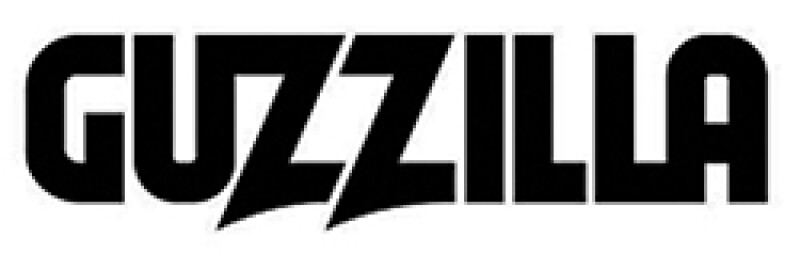Summary of the case

On November 21 2011, Taguchi Industrial filed an application for registration of the trademark above, "GUZZILLA", designating "Mining machines and apparatus; Construction machines and apparatus; etc." in Class 7 (designated goods). The trademark was granted registration on April 27 2012.
On February 22 2017, Toho filed a request for a trial for invalidation of registration of the trademark. Toho cited a trademark consisting of the letters, "GODZILLA" (cited mark).
Japan Patent Office decision
The JPO decided that the trademark does not fall under Article 4(1)(xv), (xix), (vii) of the Trademark Act. Toho appealed to the IP High Court seeking rescission of the JPO's decision.
Judgment of June 12 2018, IP High Court
The IP High Court (Presiding Judge Takabe) judged that the trademark falls under Article 4 (1)(xv) of the Trademark Act and rescinded the JPO's decision. The IP High Court stated that the trademark and the cited mark are confusingly similar in pronunciation, and that they contain features that make the two trademarks confusingly similar in appearance as well, and that the cited mark is well-known or famous and highly original. Thereafter, the IP High Court held as follows.
1. Level of relevance of goods
Regarding the machines and apparatus that are used in specialised/vocational fields from among the designated goods and the toys, stationery, clothing, food, and general merchandise etc. for which Toho licensed the cited mark, the former concerns machines for assisting people's work in industrial sites such as factories and places of business, with performance and quality providing most of the basis for selection of goods, whereas the latter concerns items that are used by general consumers in everyday life and that are difficult to distinguish from other goods of the same kind. As such, there is not much relevance in terms of nature, use, and purpose.
In contrast, goods such as hydraulic jacks, electric jacks, chain blocks, winches, reapers, electric scissors for trees, hedge trimmers, and mowers, which are among the designated goods, are available to general consumers for relatively low prices at stores such as home improvement stores and online shopping sites and television shopping programmes. As such, hydraulic jacks, electric jacks, chain blocks, winches, reapers, electric scissors for trees, hedge trimmers, mowers, from among the designated goods, as well as toys and general merchandise for which Toho licensed the cited mark are available to general consumers for relatively low prices at stores such as home improvement stores and online shopping sites and television shopping programmes, and these goods are used by general consumers in everyday life. In light of these circumstances, the trademark and the cited mark have a certain level of relevance in terms of nature, use, or purpose.
Accordingly, it should be said that the designated goods contain some goods which, when compared with goods pertaining to Toho's operation, have a certain level of relevance in terms of nature, use, or purpose.
2. Likelihood of confusion
As described above, when the circumstances for determining whether or not there is a likelihood of confusion are considered in light of the current conditions of business, the machines and apparatus that are used in specialised/vocational fields, which are among the designated goods, and the goods pertaining to Toho's operation are not very relevant.
However, the trademark and the cited mark are confusingly similar in pronunciation, with some of the features making the two trademarks confusingly similar in appearance as well. In addition, the cited mark is well-known or famous, as well as being highly original. Furthermore, with Toho's operation having become diversified, some of the designated goods have, when compared to the goods pertaining to Toho's operation, a certain level of relevance in terms of nature, use, or purpose. In addition, it can be said that these goods and the goods which pertain to Toho's operation share the same traders and consumers, who, upon conducting business, take into consideration not only the performance and quality of the goods but also the business reputation indicated by the trademark which is placed on the goods.
It must be said that some of the designated goods have a risk of causing misunderstanding, when the trademark is used in connection with such goods, that said goods pertain to Toho or to a proprietor of a business which is closely related to Toho, by way of a parent company-subsidiary relationship or as an affiliate, or which belong to a group of companies operating for commercialisation under the same label as Toho.
3. Taguchi's claims
Taguchi claims that the trademark does not take a free ride on the cited mark, and that use of the trademark does not dilute the cited mark.
However, although this was on and after November 21 2011, which is the filing date of the application for the trademark, Taguchi used the marks, "SUPER GUZZILLA" and "SPACE GUZZILLA", which are confusingly similar to "SUPER GODZILLA" and "SPACE GODZILLA", which were used by Toho. Also, although this was on and after the filing date of the application for the trademark, Taguchi widely distributed at no cost, and sold, towels, wristwatches, gloves, caps, T-shirts and hoodies with the trademark placed thereon. In addition, although this was on and after the filing date of the application for the trademark, Taguchi filed applications for registration of trademarks consisting of letters such as "ガリガリ君 (gari-gari-kun) and "STUDIO GABULLI", which are confusingly similar to well-known or famous trademarks in Japan. These acts by Taguchi indirectly support the likelihood that use of the trademark for the designated goods at the time of the filing of the application for registration of the trademark could result in the free riding on the cited mark's ability to attract consumers or in the dilution of the cited mark.
If the trademark is used for the designated goods, it could result in the free riding on the cited mark's ability to attract consumers and in the dilution of the cited mark.
Practical tips
The reason this judgment affirmed likelihood of confusion although it admitted the machines and apparatus that are used in specialised/vocational fields, which are among the designated goods, and the goods pertaining to Toho's operation are not very relevant may be because the court felt Taguchi's acts were malicious. Taguchi's three acts listed by the judgment are all on and after the filing date of the application for the trademark. In addition, the judgment listed "ガリガリ君 (gari-gari-kun) and "STUDIO GABULLI" which have no direct relationship to the trademark. The court usually avoids specifying such evidence in the judgment even if it uses it for the decision-making. However, this judgment intentionally listed these acts. This judgment has a strong message that free riding and dilution by Taguchi are not acceptable.

|
Takanori Abe |
ABE & PartnersMatsushita IMP Building1-3-7, Shiromi, Chuo-ku, Osaka, 540-0001, JapanTel: +81 6 6949 1496Fax: +81 6 6949 1487abe@abe-law.comwww.abe-law.com










